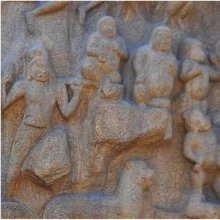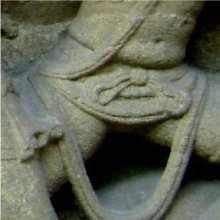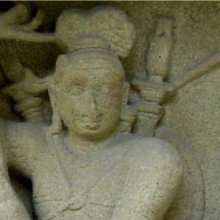Kiratarjuniya, Kirātārjunīya, Kirata-arjuniya: 8 definitions
Introduction:
Kiratarjuniya means something in Hinduism, Sanskrit. If you want to know the exact meaning, history, etymology or English translation of this term then check out the descriptions on this page. Add your comment or reference to a book if you want to contribute to this summary article.
Images (photo gallery)
In Hinduism
Purana and Itihasa (epic history)
Source: archive.org: Puranic EncyclopediaKirātārjunīya (किरातार्जुनीय).—During the life in exile in the forest of the Pāṇḍavas, Arjuna performed penance to propitiate Śiva in the Himālayas. Disguised as a forest-hunter Śiva appeared on the scene and tested Arjuna’s valour. Arjuna won in the test and was presented the Pāśupatāstra by Śiva. The story is told in Chapter 167 of the Vana Parva. (See under Arjuna).

The Purana (पुराण, purāṇas) refers to Sanskrit literature preserving ancient India’s vast cultural history, including historical legends, religious ceremonies, various arts and sciences. The eighteen mahapuranas total over 400,000 shlokas (metrical couplets) and date to at least several centuries BCE.
Languages of India and abroad
Sanskrit dictionary
Source: DDSA: The practical Sanskrit-English dictionaryKirātārjunīya (किरातार्जुनीय).—Name of a poem by Bhāravi (in which the combat of Arjuna with Śiva in the form of a Kirāta or mountaineer is poetically described.)
Derivable forms: kirātārjunīyam (किरातार्जुनीयम्).
Kirātārjunīya is a Sanskrit compound consisting of the terms kirāta and arjunīya (अर्जुनीय).
Source: Cologne Digital Sanskrit Dictionaries: Benfey Sanskrit-English DictionaryKirātārjunīya (किरातार्जुनीय).—i. e. kirāta-arjuna + īya, n. The title of a poem describing the combat of Arjuna with Śiva in the shape of a Kirāta,
Kirātārjunīya (किरातार्जुनीय).—[neuter] (the combat of) Arjuna with (Śiva in the form of) a Kirata, T. of an epic poem.
Source: Cologne Digital Sanskrit Dictionaries: Aufrecht Catalogus Catalogorum1) Kirātārjunīya (किरातार्जुनीय) as mentioned in Aufrecht’s Catalogus Catalogorum:—from Mahābhārata. Burnell. 203^b.
—from Padmapurāṇa. Burnell. 188^b.
2) Kirātārjunīya (किरातार्जुनीय):—kāvya, by Bhāravi. Jones. 410. Io. 194. 202. 203. 543-45. 1896. 2064. W. p. 151. 152. Oxf. 117^b. Cambr. 7. Paris. (B 90. 243. D 17). Khn. 40. K. 58. Kh. 65. B. 2, 74. Report. Viii. Ben. 38. Bik. 239. Kāṭm. 6 (and—[commentary]). Pheh. 5 (and—[commentary]). Rādh. 21 (and—[commentary]). NW. 622. Burnell. 156^a. Bh. 23. Bhk. 26. Bhr. 619. Poona. 228. 251. 252. 553. 554. Vienna. 17 (and avacūri). H. 53. Taylor. 1, 63. 64. 174. 299. 454. 485. Oppert. 543. 637. 1421. 1422. 1679. 1680. 1797. 2583. 2797. 5013. 6564. 6887. 7094. 7538. 7598. 7749. Ii, 802. 1050. 1954. 2037. 2326. 2427. 2562. 2714. 3491. 4534. 6893. 8184. 9021. 9243. Rice. 234. W. 1537. 1538. Peters. 3, 394. Bp. 278. Bühler 554. Quoted by Vāmana in Alaṃkārasūtravṛtti, by Kṣemendra in Suvṛttatilaka 3, 18, by Dhanapāla and Rājaśekhara Śp. p. 64. [Sūktikarṇāmṛta by Śrīdharadāsa] [Subhāshitāvali by Vallabhadeva]
—[commentary] Bik. 236. Rice. 228.
—[commentary] Śabdārthadīpikā Rasabodhinī. Oppert. 5938.
—[commentary] by Allāra Narahari. P. 9.
—[commentary] by Ekanātha. B. 2, 74. Gu. 4. Bl. 4. P. 9. Bhr. 136.
—[commentary] by Kāśīnātha. Kh. 65.
—[commentary] by Gadasiṃha L. 2140 (mentions the
—[commentary] by Prakāśavarṣa).
—[commentary] by Jonarāja, composed in 1449. Report. Viii. H. 53. Bp. 54. 262. 356.
—[commentary] Gauravadīpanī by Dāmodara Miśra. L. 2936.
—[commentary] by Dharmavijaya. L. 2806. B. 2, 74.
—[commentary] Laghuṭīkā by Prakāśavarṣa. Taylor. 1, 174. Bp. 54. 262. 278. 356.
—[commentary] by Bhagīratha. Io. 384. 543-45.
—[commentary] by Bharatasena. Io. 543-45.
—[commentary] Subhāṣiṇī by Manohara Śarman. L. 2223.
—[commentary] Ghaṇṭāpatha by Mallinātha. Io. 194. 202. 203. 543-45. 1896. 2077. W. p. 152 ([fragmentary]). Oxf. 117^b. B. 2, 74. Ben. 38. Bik. 236. Burnell. 156^b. Mysore. 7. Bhk. 26. Poona. 228. 251. 252. 553. 554. Taylor. 1, 64. Oppert. 2584. 8138. Rice. 234. W. 1539. Bühler 554.
—[commentary] by Mādhava. Oppert. 2798.
—[commentary] Kirātārjunīyakāvyadurghaṭā by Rājakuṇḍa. Report. Viii.
—[commentary] by Lokānanda. Bhr. 137.
—[commentary] Vaiṣamyoddharaṇī by Vaṅkimadāsa. L. 1644.
—[commentary] Pradīpikā by Vinayarāma or Vinayasundara. B. 2, 76. Bp. 278. 448.
—[commentary] by Harikaṇṭha. Io. 543-45.
3) Kirātārjunīya (किरातार्जुनीय):—read Bik. 235. Oppert. I, 7595 instead of 7598.
—[commentary] by Prakāśavarṣa. add Lahore. 4. Of Bp. leave only 278.
—[commentary] by Bharatasena. add L. 3183.
—[commentary] by Mallinātha. add NW. 622.
4) Kirātārjunīya (किरातार्जुनीय):—by Bhāravi. Fl. 68 (inc.). Heidelberg (5-18 with Mallinātha’s
—[commentary]). Oudh. Xx, 50. Xxii, 60. Peters. 4, 25. Stein 66. 67. Weber 2160 (and—[commentary]).
—[commentary] Prasannasāhityacandrikā by Ekanātha. Rgb. 332 ([fragmentary]).
—[commentary] by Jonarāja. Stein 67.
—[commentary] Anvayadīpikā by Nṛsiṃha. Stein 67.
—[commentary] Bālabodhinī by Malla. Peters. 4, 25. Extr. 22. He used the
—[commentary] of Mallinātha.
—[commentary] Ghaṇṭāpatha by Mallinātha. Fl. 68 (inc.). Oudh. Xx, 50. Xxii, 60. Rgb. 331. Stein 67.
—[commentary] Manoramā by Rāmacandra Kavi. L. 3369 (1-5).
5) Kirātārjunīya (किरातार्जुनीय):—kāvya, by Bhāravi. Hz. 253 (sarga 10-18). Ulwar 898. 900 (sarga 3-13).
—[commentary] Kathambhūtī. Ulwar 901 ([fragmentary]).
—[commentary] Ghaṇṭāpatha by Mallinātha. Hz. 253 (sarga 10-18). Ulwar 898. 899.
—[commentary] Pradīpikā by Vinayasundara. Ulwar 900 (sarga 3-13).
6) Kirātārjunīya (किरातार्जुनीय):—by Bhāravi. Ak 970 (7-15, 53). As p. 46 (2 Mss.). Bd. 376. Hz. 947. Il. Io. 194. 543. 1896. 1930. 2064. L.. 384-388. Tod 15. C. [anonymous] Śg. 2, 106 (sarga 5). C. Bālabodhinī. Bd. 376. C. by Allāḍa Narahari. Ak 469 (1-10. 11 inc.). C. by Ekanātha. Peters. 6, 329 (1-6). C. by Kāśīnātha. Peters. 5, 330 (1-13). C. by Dharmavijayagaṇi. Peters. 5, 331 (sarga 1). C. Laghuṭīkā by Prakāśavarṣa. Bd. 377 ([fragmentary]). C. Tattvadīpikā or Sarvamaṅgalā by Bhagīratha. Io. 384. 543. C. by Bharatasena. Io. 543. C. Ghaṇṭāpatha by Mallinātha. Ak 468 (1-7). 470 (7-15, 53). As p. 46. Hz. 947. Io. 194. 202. 203. 543. 1896. 2077. 2539 ([fragmentary]). L.. 389 (2-18). C. by Rāmacandra. Hpr. 1, 261 (sarga 1). But in the Colophon it is marked as being composed by Gadasiṃha, son of Śivasiṃha. C. Sārāvalī by Harikaṇṭha. As p. 47. Io. 543. 1307. Sthūlatātparyārtha. Io. 543. 898.
Source: Cologne Digital Sanskrit Dictionaries: Monier-Williams Sanskrit-English DictionaryKirātārjunīya (किरातार्जुनीय):—[from kirāta] n. Name of a poem by Bhāravi (describing the combat of Arjuna with the god Śiva in the form of a wild mountaineer or Kirāta; this combat and its result is described in the [Mahābhārata iii, 1538-1664]).
[Sanskrit to German]
Sanskrit, also spelled संस्कृतम् (saṃskṛtam), is an ancient language of India commonly seen as the grandmother of the Indo-European language family (even English!). Closely allied with Prakrit and Pali, Sanskrit is more exhaustive in both grammar and terms and has the most extensive collection of literature in the world, greatly surpassing its sister-languages Greek and Latin.
See also (Relevant definitions)
Partial matches: Arjuniya, Kirata.
Full-text (+2096): Bharavi, Apapayas, Saukara, Nishabda, Avatas, Asutara, Sampida, Asukha, Vishamita, Sasusu, Ayavant, Parimandalita, Ghanapadavi, Ghanavartman, Asharman, Dhanadhipati, Sampratiti, Suninada, Nirudhi, Tamopaha.
Relevant text
Search found 26 books and stories containing Kiratarjuniya, Kirata-arjuniya, Kirāta-arjunīya, Kirātārjunīya; (plurals include: Kiratarjuniyas, arjuniyas, arjunīyas, Kirātārjunīyas). You can also click to the full overview containing English textual excerpts. Below are direct links for the most relevant articles:
Amarakoshodghatana of Kshirasvamin (study) (by A. Yamuna Devi)
Amarakośodghāṭana (Introduction) < [Chapter 2 - Kṣīrasvāmin: Life and Works]
Kuntaka’s evaluation of Sanskrit literature (by Nikitha. M)
1. Kirātārjunīya in Kuntaka’s treatment < [Chapter 3 - Kuntaka’s estimation of Mahākāvyas of other Poets]
Conclusion to Chapter 3 < [Chapter 3 - Kuntaka’s estimation of Mahākāvyas of other Poets]
3.8 (f): Compositional figurativeness or prabandha-vakratā < [Chapter 1 - Vakroktijīvita: A Synoptic Survey]
Shishupala-vadha (Study) (by Shila Chakraborty)
The influence of Kālidāsa, Bhāravi and Bhaṭṭi on the Śiśupālavadha < [Introduction]
Spy in the Śiśupālavadha < [Chapter 4 - Activities of spy]
Spies in ancient Indian kingdoms (Introduction) < [Chapter 4 - Activities of spy]
Atithi or Guest Reception (study) (by Sarika. P.)
Part 3 - References to Hospitality in the Kirātārjunīya < [Chapter 4 - Atithi-saparyā in Classical Sanskrit Literature]
Harshacharita (socio-cultural Study) (by Mrs. Nandita Sarmah)
Part 2.3: Relation between the King and the Ministers < [Chapter 5 - Political Aspects]
Early Chola Temples (by S. R. Balasubrahmanyam)
Tanjavur < [Chapter XIII - Prasada: Component Parts]
Dravidian Art < [Chapter XIV - Conclusion]


